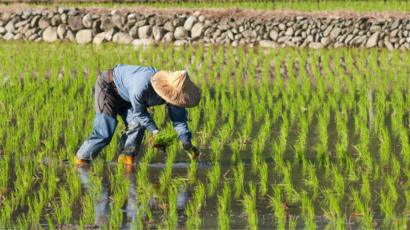BBC Science Correspondent, San Francisco
 THINKSTOCK
THINKSTOCK Scientists say they are concerned at the rate at which methane in the atmosphere is now rising.
After a period of relative stagnation in the 2000s, the concentration of the gas has surged.
Methane (CH4) is a smaller component than carbon dioxide (CO2) but drives a more potent greenhouse effect.
Researchers warn that efforts to tackle climate change will be undermined unless CH4 is also brought under tighter control.
“CO2 is still the dominant target for mitigation, for good reason. But we run the risk if we lose sight of methane of offsetting the gains we might make in bringing down levels of carbon dioxide,” said Robert Jackson from Stanford University, US.
Prof Jackson was speaking ahead of this week’s American Geophysical Union (AGU) meeting in San Francisco where methane trends will be a major point of discussion.
With colleagues who are part of an initiative called the Global Carbon Project, he has also just authored an editorial in the journal Environmental Research Letters (ERL).
This paper makes a clarion call to the scientific community to address the knowledge deficit that surrounds CH4.
Quite why methane has suddenly spiked is not obvious. After barely moving between 2000 and 2006, the concentration in the atmosphere ticked upwards from 2007, and then jumped sharply in 2014 and 2015.
In those final two years, methane rose rapidly by 10 or more parts per billion (ppb) annually.
It is now just above 1,850ppb. By contrast, global CO2 emissions have flattened somewhat of late, giving hope that the rise in its atmospheric concentration (currently just above 400 parts per million) might also slow.
“Methane has many sources, but the culprit behind the steep rise is probably agriculture,” Prof Jackson told BBC News.
“We do see some increased fossil fuel emissions over the last decade, but we think biological sources, and tropical sources, are the most likely.”
Agricultural sources would include cattle and other ruminants, as well as rice paddies.
Emissions from wetlands are almost certainly a significant part of this story as well. But so too could be the role played by the chemical reactions that normally remove methane from the atmosphere.
One of the most important of these is the destruction process involving the so-called hydroxyl radical.
The concentration of this chemical species in the atmosphere might also be changing in some way.
According to the ERL editorial, there needs to be a particular push on understanding such methane “sinks”.
 CNES
CNES CH4 is about 30 times better than CO2, over a century timescale, at trapping heat in the atmosphere.
Scientists use computer models to try to project how Earth will warm given a certain mix of gases, and right now methane’s growth rate is close to a path that would take the world into a very challenging future.
“If we want to stay below two degrees temperature increase, we should not follow this track and need to make a rapid turn-around,” said Dr Marielle Saunois from the University of Versailles Saint Quentin, France. She is the lead author on the ERL paper.
One development that should help scientists as they grapple with the methane issue is the launch of new satellites.
A number sensors are planned that will specifically target carbon molecules.
“I’m optimistic that the scientific community and the policymakers will be able to have better information. I’m optimistic because there are new satellites coming along that will give us the power to see methane concentrations all over the world on a regular basis,” explained Prof Jackson.
“Methane is more difficult to study than CO2 because it’s more diffuse, but I think we’re poised to make really good progress over the next few years.”
Jonathan.Amos-INTERNET@bbc.co.uk and follow me on Twitter: @BBCAmos
